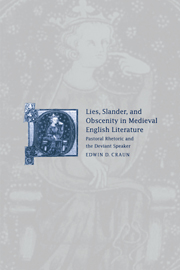 Lies, Slander and Obscenity in Medieval English Literature
Lies, Slander and Obscenity in Medieval English Literature Published online by Cambridge University Press: 31 October 2009
“Thou getest fable noon ytoold for me,
For Paul, that writeth unto Thymothee,
Repreveth hem that weyven soothfastnesse
And tellen fables and swich wrecchednesse.
Why sholde I sowen draf out of my fest,
Whan I may sowen whete, if that me lest?
For which I seye, if that yow list to heere
Moralitee and vertuous mateere,
And thanne that ye wol yeve me audience.”
(Tales.X.31–9)When the Parson of The Canterbury Tales refuses to tell a fable, he does more than announce his non-fictive catechesis, more than reflect indirectly on the Manciple's Ovidian fable of Phebus and the crow. Addressed by the Host as “Sire preest,” he speaks as a priest about the speech appropriate for a priest. Although pastoral discourse on deviant speech, as we have seen, singles out certain social groups as prone to certain Sins of the Tongue (lawyer to lying, monk to murmur, entertainer to scurrility), it rarely distinguishes between cleric and laic, setting different, or stricter, norms for the clergy. On fables, it does. Under ociosa verba (idle or empty words) or vaniloquium, six pastoral texts, including one of the two which Siegfried Wenzel has found to be the closest, of known texts, to the Parson's treatment of the Seven Sins, forbid fables (fabulae) and other trifling speech (nugae) to priests, lest such idle words compromise their authority as religious teachers.
To save this book to your Kindle, first ensure [email protected] is added to your Approved Personal Document E-mail List under your Personal Document Settings on the Manage Your Content and Devices page of your Amazon account. Then enter the ‘name’ part of your Kindle email address below. Find out more about saving to your Kindle.
Note you can select to save to either the @free.kindle.com or @kindle.com variations. ‘@free.kindle.com’ emails are free but can only be saved to your device when it is connected to wi-fi. ‘@kindle.com’ emails can be delivered even when you are not connected to wi-fi, but note that service fees apply.
Find out more about the Kindle Personal Document Service.
To save content items to your account, please confirm that you agree to abide by our usage policies. If this is the first time you use this feature, you will be asked to authorise Cambridge Core to connect with your account. Find out more about saving content to Dropbox.
To save content items to your account, please confirm that you agree to abide by our usage policies. If this is the first time you use this feature, you will be asked to authorise Cambridge Core to connect with your account. Find out more about saving content to Google Drive.